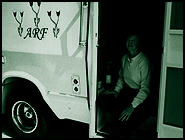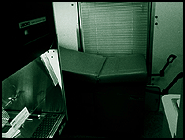High-Tech May Lower Odds
THE POTENTIAL RISK in the Boston program is simply unknown. Experts say sperm washing can dramatically reduce the viral load in semen, but cannot guarantee that absolutely all the virus gets washed away. To further reduce the danger to mother and child, the Assisted Reproduction Foundation will encourage couples to use in vitro fertilization - the process of creating a human embryo in a laboratory dish. That way, the woman never comes in contact with sperm or semen, just the embryo. It may be possible to test the embryo for HIV before it is transferred into the woman's body, but that test is still experimental.
To create the experimental fertility program, Ann Kiessling teamed up with
several Harvard infertility specialists who will conduct the medical
procedures. She's already built a clinic - in a distinctly unorthodox
location. In the parking lot of a suburban Boston medical center, Kiessling
unlocks the door to a conventional-looking recreational vehicle with a
connected trailer. Inside is nearly all the gear needed for in vitro
fertilization. Why a clinic on wheels? Over the years, Kiessling tried to
convince a number of infertility programs to offer help for HIV-infected
couples. She says some were interested but then backed out for fear of
unwanted publicity.
"I decided that since I had so many hospitals decide it was a bad idea, we needed to pick up and move if we needed to, so that's how we got into the
concept of a mobile clinic," Kiessling says.

|
Kiessling and the mobile infertility clinic of the Assisted Reproduction Foundation.
|
The mobile lab has yet to produce its first human embryo but is already
generating scientific controversy. Kiessling's Harvard colleague, Deborah
Anderson, runs a completely separate HIV research program and is trying to
get the CDC and other medical authorities to endorse sperm washing as a safe
technique. Anderson fears that Kiessling is moving too quickly with the
clinical trial. Anderson recalls a 1990 Virginia case where a doctor
provided sperm washing to a serodiscordant couple. The woman contracted HIV
but did not get pregnant. The CDC investigated but could not determine
whether the woman got HIV because of the sperm washing procedure.
"It set the field back ten years," Anderson says. "And that could happen again without the proper protocols in place."
Kiessling replies she is taking all the proper steps to establish a
scientifically and ethically valid program. She asked the research oversight
committees of three separate Harvard teaching hospitals to approve her
study, figuring that at least one of them will take on the politically-delicate project. One hospital has granted initial approval but wants assurances that the research subjects fully recognize the risks involved.
Some critics grumble privately that Kiessling is too much a maverick. People
who know her say the 54-year-old biochemist is used to scientific conflict.
Her supporters include retired California orthopedic surgeon Leonard
Simpson, a trustee of the Assisted Reproduction Foundation, who says
Kiessling's independent nature impels her to serve the patients that other
fertility specialists neglect.
"I think she's probably dealt with controversy throughout her whole
professional career," Simpson says. "Being a maverick, or one who thrives on standing up to controversy when she believes it's right, is probably a driving force for her."
If the clinical trials with heterosexual couples succeed, the Assisted
Reproduction Foundation will attempt to expand its work to serve a diverse
group of patients. The clinic will probably be the only one in the nation
to accept applications from women who wish to carry the child of a gay man
with HIV disease. Foundation trustee Leonard Simpson, an activist on gay
and HIV issues and the father of a girl conceived before he contracted HIV,
says gay men have as much right to assisted reproduction as heterosexuals -
even men with HIV disease.

|
The exam room for the Assisted Reproduction Foundation's mobile fertility clinic in a converted motor-home.
|
"With HIV disease, there is [social] prejudice, discrimination, ignorance," Simpson says. "If a woman had breast cancer, most of us would be very sympathetic if a woman wanted to conceive and have a child in the face of an illness."
The Assisted Reproduction Foundation has raised more than $350,000 from
private benefactors to create the clinical program for people with HIV. A
key goal is to offer infertility services at low cost. At many infertility
clinics, the bill for in vitro fertilization can easily top $10,000. Most
patients pay out of their own pockets. Ann Kiessling wants to start working
with patients this summer, but it is unclear whether she can raise enough
money and get the final scientific approval she needs to proceed.
Next:
Difficult Decisions
HIV and Fertility home
|